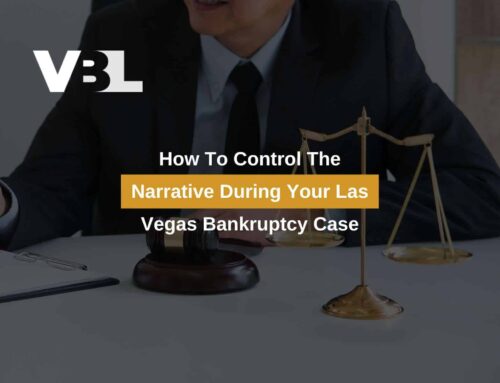Filing Bankruptcy In Vegas & CD’s
Having a diverse portfolio of investments is a favored method of financial experts in Las Vegas and Nevada. But the market is volatile and interest rates are high, making forms of investments like stocks and real estate harder and riskier to join. These conditions are causing more people to invest their funds in secure forms of investment, like certificates of deposit, or CD’s. While they offer lower returns compared to other investments, CD’s offer the benefit of guaranteed returns, which isn’t always a given for investments. The funds in a CD must remain there until an agreed-upon date, or the investor can be subject to penalties and fees for early withdrawal.
The funds in a CD can also become an issue if the investor decides that they want to file for bankruptcy. Not all assets are protected in bankruptcy- a debtor who files for chapter 7 may have to surrender assets in exchange for the benefit of wiping away unsecured debts. Are certificates of deposit among the assets that can be lost to a chapter 7 bankruptcy filing? Which assets can be protected when a debtor files for bankruptcy in Las Vegas? Read on for the answers to these questions and more. To schedule your free bankruptcy consultation with the Law Offices of Erik Severino, call 702-370-0155.

Why Invest Using CD’s?
A certificate of deposit isn’t every person’s preferred form of investment. Compared to other investment strategies, CD’s offer lower rates of return. But when an investor’s priority is security, CD’s are beneficial because the investor knows exactly how much they will be receiving if they avoid early withdrawal. The funds in a CD must stay there for a set amount of time known as the term. When the term is completed, the CD is mature and can be withdrawn from without fees or penalties. In times like these, when interest rates are high, more people value security in their investments and choose to use CD’s in their portfolios. CD’s usually have better rates of return than traditional savings accounts offered by most banks. High interest rates mean that the rates of return for CD accounts are higher and the cost to buy into other forms of investment is also high. This makes CD’s a more attractive option than ever.
If an investor with funds in a CD finds themselves in a pinch, withdrawing from the CD isn’t ideal. The fee for early withdrawal is known as an Early Withdrawal Penalty, or EWP. EWP’s can vary based on the financial institution that is providing the CD account. Most financial institutions will charge an EWP that is based on the original term of the CD. For example, if the CD’s term was supposed to be one year, the financial institution might charge the customer 3 months’ worth of interest on the account as an EWP. If the CD’s term was supposed to be 3 years, the financial institution will likely be charged more months’ worth of interest as an EWP, such as 6 months’ worth.
Can I Protect My CD In a Las Vegas Bankruptcy Case?
It is a commonly mistaken belief that a debtor who declares chapter 7 bankruptcy must give up everything that they own. However, there are several assets and personal possessions that a debtor can protect in bankruptcy. The debtor must list all of their assets in their bankruptcy schedules, and then apply exemptions to them so they will be safe from the trustee and creditors. Exemptions have different categories and different amounts, some of which will double for married couples while others will not. So is there a specific bankruptcy exemption that a Las Vegas chapter 7 bankruptcy debtor can use to protect funds in a CD? Unfortunately, there is no exact statutory exemption available for CD investments. However, Nevada does offer a wildcard exemption, or an exemption that can be used on any asset of the debtor’s choosing. This exemption can protect $10,000 for debtors in Las Vegas. It can be used to protect funds in a CD, but the debtor should make sure they don’t have any other assets that they prioritize more highly that will need protection from the wildcard exemption before applying it to a CD.
What Are The Other Types Of Bankruptcy Exemptions For Nevada?
Because bankruptcy exemptions have specific categories, a debtor will likely need to apply several of them to make sure that all of their assets and possessions are protected. Before filing any type of bankruptcy petition in Las Vegas, a debtor should review their situation with a lawyer who is knowledgeable about Nevada’s different bankruptcy exemptions. Below are some of Nevada’s most commonly used exemptions for chapter 7 bankruptcy- if you have any questions or concerns about them, don’t hesitate to contact the Law Offices of Erik Severino for your free consultation at 702-370-0155.
- Homestead exemption: This exemption can be applied to a bankruptcy debtor’s house, condominium, or any other residence in which they live full-time. To use a homestead exemption in Nevada, the debtor must file a homestead declaration in their county’s recorder’s office. This exemption doubles for married couples.
- Motor vehicle exemption: This exemption is meant to be used on a car, truck, SUV, etc., and can’t be used on a boat or recreational vehicle. If the bankruptcy debtor has a disability, which could require specialized equipment in their vehicle, there is no limit to the value of the motor vehicle exemption.
- Tools of the trade exemption: A self-employed bankruptcy debtor will have no way to earn a living if the items they use in their line of work are taken by the bankruptcy trustee to pay off debts. This exemption can be used to protect professional equipment, books, and other supplies used to run a business. There is an additional provision for farmers who need to protect trucks, tools, equipment, and seeds.
- Wage exemption: How much can be protected through Nevada’s wage exemption depends on the debtor’s disposable weekly earnings. The current cutoff is $770 per week. If a debtor’s disposable weekly earnings fall below that amount, they can protect 82% of their earnings. If their disposable earnings are more than $770 per week, up to 75% can be protected.
Start Your Search For a Quality Las Vegas Bankruptcy Attorney Here.
Are you looking to clear your burdensome debts without wiping out all of your assets in the process? If so, chapter 7 bankruptcy might be the solution to your problems. However, a chapter 7 bankruptcy petition needs to be crafted perfectly to make sure that the case goes smoothly. Ensure that your assets are protected and that your petition is correct so you can enjoy all of the benefits that bankruptcy has to offer. Of course, creating a full and accurate bankruptcy petition is easier said than done. Hiring a skillful bankruptcy team to manage your case streamlines the bankruptcy process and allows you to file your case with confidence. When you choose the Law Offices of Erik Severino for your Las Vegas bankruptcy filing, you can rest assured knowing that your case is in good hands. We have payment plan options starting as low as Zero Dollars Down for eligible chapter 7 bankruptcy clients. To learn more, call 702-370-0155 to schedule your free consultation.

Las Vegas Bankruptcy Lawyers
LAS VEGAS
7251 W Lake Mead BLVD #300
Las Vegas, NV89128
Office: 702-879-2499
Email: [email protected]
HENDERSON
1489 W Warm Springs Rd. Ste 110
Henderson, NV 89014
Email: [email protected]
Additional Information at:
Phoenix Bankruptcy Lawyer
Phoenix DUI Lawyer
Chandler Bankruptcy Lawyer
Vegas Zero Down Bankruptcy Attorney
Gilbert Bankruptcy Lawyers
Arizona Zero Down DUI
AZ Bankruptcy Lawyer
















